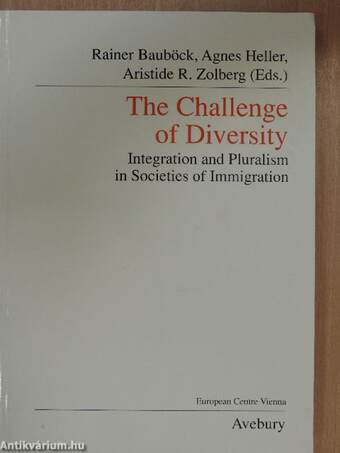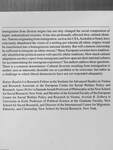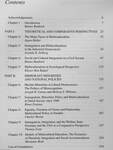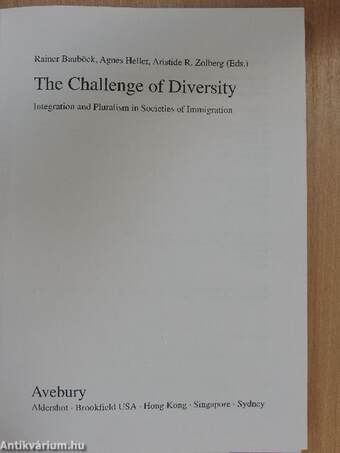1.118.123
kiadvánnyal nyújtjuk Magyarország legnagyobb antikvár könyv-kínálatát
The Challenge of Diversity
Integration and Pluralism in Societies of Immigration
| Kiadó: | Avebury |
|---|---|
| Kiadás helye: | Aldershot |
| Kiadás éve: | |
| Kötés típusa: | Ragasztott papírkötés |
| Oldalszám: | 279 oldal |
| Sorozatcím: | European Centre Vienna |
| Kötetszám: | 21 |
| Nyelv: | Angol |
| Méret: | 24 cm x 17 cm |
| ISBN: | 1-85972-401-9 |
naponta értesítjük a beérkező friss
kiadványokról
naponta értesítjük a beérkező friss
kiadványokról
Fülszöveg
Immigration from diverse origins has not only changed the social composition of
highly industrialized societies. It has also profoundly affected their cultural identi-
ties. Nations originating from immigration, such as the US A, Australia or Israel, have
reluctantly abandoned the vision of a melting pot wherein all ethnic origins would
be transformed into a homogeneous national identity. But will common citizenship
be sufficient to integrate an ethnic mosaic? Many European societies have tradition-
ally identified the political nation with specific ethnic traditions. How much cultural
adaptation can they expect from immigrants and how open are their national cultures
for accommodating the immigrant experience? Ten authors address these questions.
There is a common denominator: Cultural diversity resulting from immigration is
neither seen as inherently desirable nor as a problem to be overcome, but rather as
a challenge to which liberal democracies have not yet... Tovább
Fülszöveg
Immigration from diverse origins has not only changed the social composition of
highly industrialized societies. It has also profoundly affected their cultural identi-
ties. Nations originating from immigration, such as the US A, Australia or Israel, have
reluctantly abandoned the vision of a melting pot wherein all ethnic origins would
be transformed into a homogeneous national identity. But will common citizenship
be sufficient to integrate an ethnic mosaic? Many European societies have tradition-
ally identified the political nation with specific ethnic traditions. How much cultural
adaptation can they expect from immigrants and how open are their national cultures
for accommodating the immigrant experience? Ten authors address these questions.
There is a common denominator: Cultural diversity resulting from immigration is
neither seen as inherently desirable nor as a problem to be overcome, but rather as
a challenge to which liberal democracies have not yet responded adequately.
Rainer Baubock is Research Fellow at the Institute for Advanced Studies in Vienna
and Research Associate at the European Centre for Social Welfare Policy and
Research. Agnes Heller is Hannah Arendt Professor of Philosophy at the New School
for Social Research, New York, and Member of the External Faculty of the European
Centre for Social Welfare Policy and Research in Vienna. Aristide R. Zolberg is
University-in-Exile Professor of Political Science at the Graduate Faculty, New
School for Social Research, and Director of the International Center for Migration,
Ethnicity, and Citizenship, New School for Social Research, New York. Vissza
Témakörök
- Szociológia > Társadalmi csoportok > Kisebbségek > Bevándorlók
- Idegennyelv > Idegennyelvű könyvek > Angol > Szociológia > Társadalmi csoportok > Kisebbségek > Bevándorlók
- Szociológia > Szociálpolitika > Általában
- Szociológia > Tanulmányok, esszék
- Idegennyelv > Idegennyelvű könyvek > Angol > Szociológia > Tanulmányok, esszék
- Idegennyelv > Idegennyelvű könyvek > Angol > Szociológia > Szociálpolitika > Általában










